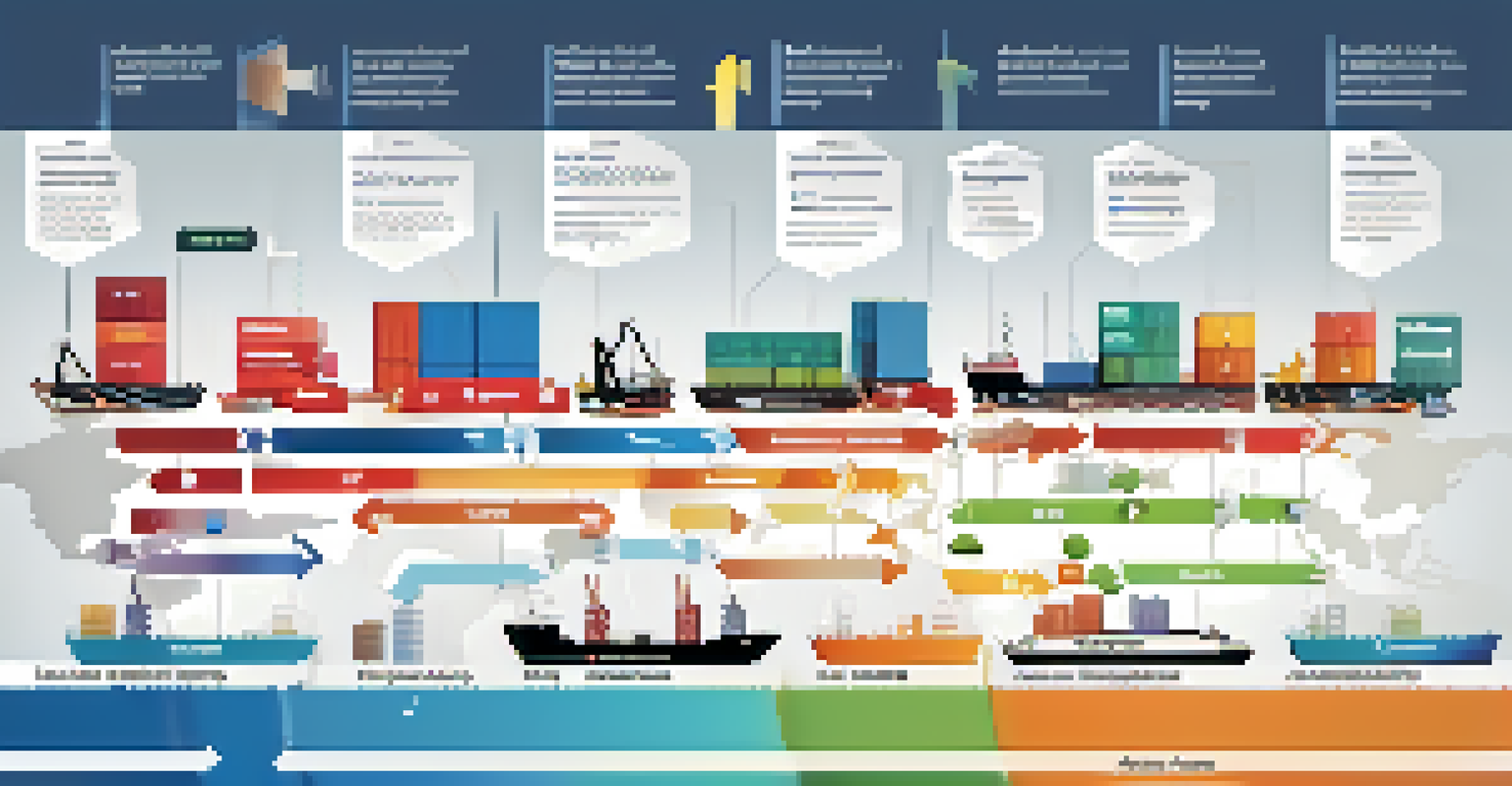Understanding Incoterms: Essential for Export Management

What Are Incoterms and Why They Matter in Trade
Incoterms, short for International Commercial Terms, are essential rules that define the responsibilities of buyers and sellers in international transactions. They clarify who is responsible for shipping, insurance, and tariffs, which can be a maze for those new to exporting. Understanding these terms is crucial because they help prevent misunderstandings and disputes that could derail a deal.
In the world of trade, knowledge is power, and understanding Incoterms is key to navigating the complexities of international shipping.
For instance, if you're exporting goods to a distant country, knowing whether you're responsible for shipping or the buyer is can save you from unexpected costs. Think of Incoterms as the rulebook for international shipping—without it, you might just be playing a game with no clear guidelines. So, having a solid grasp of these terms is not just beneficial; it’s essential for smooth operations.
In short, Incoterms serve as a universal language in global trade, making transactions more efficient. By establishing clear expectations, they foster trust between trading partners, which is vital for long-term business relationships. The right understanding of these terms can also enhance your negotiating power.
The Different Types of Incoterms Explained Simply
Incoterms come in different categories, each with specific responsibilities assigned to buyers and sellers. For example, terms like EXW (Ex Works) put the onus on the buyer to handle all logistics from the seller’s premises, whereas terms like DDP (Delivered Duty Paid) indicate that the seller takes care of everything until the goods reach the buyer’s location. This variety allows exporters to choose terms that best suit their business model and risk appetite.

Imagine you're shipping a package to a friend. If you use EXW, your friend picks it up from your house, while with DDP, you handle all the shipping until it arrives at their doorstep. This analogy highlights how Incoterms can change the dynamics of responsibility and cost-sharing. Having multiple options ensures that businesses can tailor agreements based on their capabilities and the specific needs of the transaction.
Incoterms Simplify Trade Responsibilities
Understanding Incoterms clarifies the responsibilities of buyers and sellers, helping to prevent misunderstandings in international transactions.
Understanding these different terms is key for effective export management. It not only aids in cost estimation but also helps in aligning logistics strategies. By choosing the right Incoterms, businesses can streamline their operations and avoid unnecessary complications.
How Incoterms Impact Shipping Costs and Risks
One of the most significant aspects of Incoterms is their influence on shipping costs and risks. Depending on the chosen term, either the buyer or seller may bear various costs, such as freight, insurance, and customs duties. For instance, under CIF (Cost, Insurance, and Freight), the seller is responsible for the costs up to the destination port, which can lead to higher initial pricing but may provide more predictability for the buyer.
Good communication is the bridge between confusion and clarity, especially when it comes to Incoterms in international trade.
Picture the shipping process as a relay race; each party has a specific leg to run. If you choose a term that places more responsibility on the seller, that runner has to carry a heavier load, impacting the overall cost. Conversely, a term that favors the buyer might result in lower upfront costs but could lead to higher expenses later on. Understanding these dynamics helps businesses make informed decisions.
Moreover, knowing who bears the risk at each stage of the shipping journey is crucial. If an accident occurs during transit, the party responsible for that leg of the journey will likely absorb the loss. Therefore, selecting the right Incoterm is not just about costs; it’s also about risk management in international trade.
Common Mistakes to Avoid with Incoterms
Navigating Incoterms can be tricky, and many exporters make common mistakes that can lead to costly errors. One frequent pitfall is misinterpreting the responsibilities tied to each term. For example, assuming that 'FOB' (Free on Board) means that the seller is liable for all costs until delivery at the buyer's facility can result in unexpected expenses. Clarity is key, and understanding the nuances of each term is essential.
Another mistake is failing to communicate Incoterms clearly in contracts. If the terms are not explicitly stated, it can lead to confusion and disputes down the line. Think of it like a game of telephone—messages can get distorted and lead to misunderstandings. It's important to ensure that all parties are on the same page, with a shared understanding of the agreed terms.
Choose Incoterms Based on Risk
Selecting the right Incoterms allows businesses to tailor their agreements based on their risk tolerance and logistics capabilities.
Lastly, some businesses overlook the updates to Incoterms, which can change every ten years. Staying informed about the latest revisions ensures that you are using the most current terms in your agreements. By avoiding these common mistakes, exporters can save time, money, and headaches.
The Role of Incoterms in International Negotiations
In international trade, negotiations can be complex, and Incoterms play a pivotal role in that process. Understanding how these terms affect costs and responsibilities can give you an edge in negotiations. For instance, if you know that your competitor uses a term that places more risk on the buyer, you might leverage that information to negotiate a better deal for yourself.
Think of it like bargaining at a market; knowing the value of what you’re offering makes you a stronger negotiator. The same principle applies when discussing Incoterms. When both parties understand their obligations, it leads to smoother negotiations and fosters a collaborative atmosphere. It’s all about finding a common ground where both parties feel secure in their agreement.
Furthermore, being knowledgeable about Incoterms can enhance your credibility in the eyes of your trading partners. It signals that you're serious about your business and that you understand the intricacies of international trade. This knowledge can help build trust and long-lasting relationships, which are invaluable in the world of exports.
How to Choose the Right Incoterms for Your Business
Choosing the right Incoterms for your business requires careful consideration of your shipping capabilities, risk tolerance, and the nature of your goods. Start by evaluating your logistics and supply chain strengths. If you have a strong logistics network, you might opt for terms that place more responsibility on you, like FCA (Free Carrier). However, if you’re new to exporting, you may want to lean towards terms that minimize your exposure to risk.
Next, consider the nature of your goods and the destination. Certain products may require more careful handling, which could influence your choice of Incoterms. For example, perishable goods may benefit from terms that ensure quick delivery, reducing the risk of spoilage. Think about it as choosing the right vehicle for a road trip; your destination and cargo determine the best fit.
Stay Updated on Incoterm Changes
Continuous education on Incoterms is vital as rules change periodically, ensuring businesses remain competitive and compliant in international trade.
Lastly, don’t hesitate to consult with logistics experts or legal advisors. They can provide valuable insights on which terms might offer the best balance between cost and responsibility for your specific situation. By taking the time to choose the right Incoterms, you can set your export business up for success.
Keeping Up with Incoterms: Training and Resources
Staying updated on Incoterms is crucial for anyone involved in international trade. The rules can change, and new terms can be introduced, making continuous education essential. Many organizations offer training sessions, both online and in-person, that can help you and your team grasp the latest developments and best practices in using Incoterms.
Additionally, there are various resources available, such as guides, webinars, and industry publications that focus on international trade. These materials can provide deeper insights into the practical applications of Incoterms in real-world scenarios. Think of these resources as your toolkit; the more tools you have, the better equipped you'll be to handle challenges.

Furthermore, engaging with industry networks can also provide valuable perspectives on how peers are navigating Incoterms. Sharing experiences and learning from others can help you avoid pitfalls and refine your approach. By investing in ongoing training and resources, you position your business for better results in the complex world of international trade.